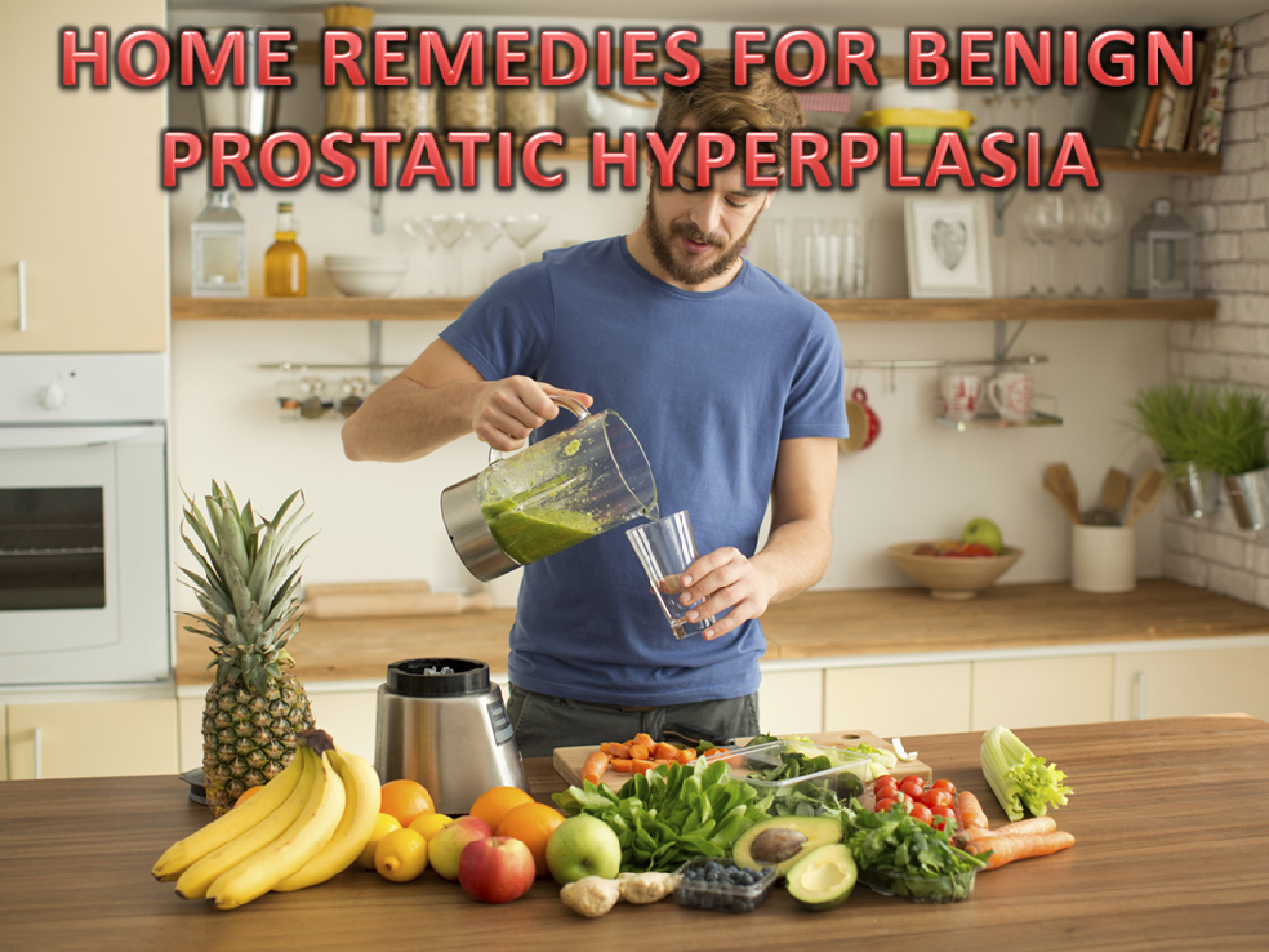Home Remedies For Benign Prostatic Hyperplasia
OVERVIEW
Benign prostatic hyperplasia is a condition that is caused when the prostate gland enlarges, potentially slowing or blocking the urine stream. Other names for benign prostatic hyperplasia include benign prostatic hypertrophy, an enlarged prostate, and BPH. We have certain HOME REMEDIES FOR BENIGN PROSTATIC HYPERPLASIA which help ease the symptoms and decrease the progression of a disease.
THE PROSTATE GLAND
The prostate is about the size of a walnut. It surrounds the urethra, which carries urine from the bladder. As men age, their prostate often enlarges. This puts pressure on their urethra causing symptoms.
What are the symptoms of BPH?
- Waking up to urinate at night
- Poor urine flow
- Frequent urination
- Bladder Infections
- Urinary leakage or bladder control problems
- Blood in urine.
If BPH is left unattended, an enlarged prostate can block the flow of urine out of the bladder, leading to other complications like urinary retention, UTIs, bladder stones and kidney damage.
Certain HOME REMEDIES FOR BENIGN PROSTATIC HYPERPLASIA and lifestyle changes can help ease the symptoms and decrease the progression of a disease.
NATURAL HOME REMEDIES FOR BENIGN PROSTATIC HYPERPLASIA
-
Sitz Bath
 A sitz bath (also called a hip bath) is a type of bath in which only the hips and buttocks are soaked in water or saline solution. Sitz bath is a soothing and effective remedy for enlarged prostate. The hot bath will help relax the pelvic muscles, reduce swelling and promote healing.
A sitz bath (also called a hip bath) is a type of bath in which only the hips and buttocks are soaked in water or saline solution. Sitz bath is a soothing and effective remedy for enlarged prostate. The hot bath will help relax the pelvic muscles, reduce swelling and promote healing.
How to take a sitz bath?
- Fill one bathtub with warm water and add ½ cup of salt to it.
- Fill another bathtub with cold water and add a few drops of lavender essential oil to it.
- First, sit in the bathtub with hot water up to your waist for 3 minutes.
- Then, sit in the bathtub with cold water up to your waist for 1 minute.
- Repeat twice or thrice. The last bath should always be in the cool water.
-
Pumpkin seeds & Watermelon seeds

Pumpkin seeds are rich in zinc content and have excellent diuretic properties. Watermelon seeds are effective in treating prostate problems. They are well known for treatment of urination problems and also to strengthen immune systems.
How to consume these seeds?
- Consume seeds alone or by mixing it with salt.
- You can also add seeds in tea or simply boil them in water, let it cool and drink it.
-
Stinging Nettle

Stinging nettle also is known as Bichchhu but in Hindi, is a perennial flowering plant that has been used medicinally for ages. It is best known for the stinging reaction that occurs when the skin comes into contact with the fine hairs located on its leaves and stems.
Stinging nettle can also lessen BPH symptoms. The root contains essential bioactive phytochemicals that help shrink prostate tissue. Being a natural diuretic, it also encourages the elimination of inflammatory wastes through urination.
How to consume the stinging nettle?
- Add 1 teaspoon of dried nettle leaves to a cup of hot water.
- Strain it after 10 minutes.
- Drink this tea 2 or 3 times daily.
-
 Corn Silk
Corn Silk
The corn silk is the stigma and style of the female part of the corn. The stigma is the sticky end of the silk where pollen attaches.
Corn silk is a time-tested remedy to fight off symptoms of prostate enlargement. It acts as a natural diuretic and even helps relax the urinary muscles and lining. This improves urine flow.
- Add 15 drops of corn silk extract to 1 cup of water and drink it a few times a day.
-
Apple Cider Vinegar
Apple cider vinegar has astringent properties that help shrink swollen prostate glands. It also aids weight loss and helps prevent complications of enlarged prostate like UTIs.
How to consume it?
- Mix 1 to 2 tablespoons of apple cider vinegar and 1 tablespoon of honey in a glass of warm water. Drink it twice daily.
- You can also mix 1 cup of apple cider vinegar to a tub of water and soak in it for 10 to 15 minutes a few times a week.
-
EXERCISES
Muscles around the bladder can become weak as you age. Various types of exercises can be helpful for men with prostate problems to strengthen the muscles.
Kegel exercises
Kegel exercises can strengthen and train your pelvic floor muscles to help control urination.
How to do kegel exercises?
- First, you must find the muscles of your pelvic floor. To do so, start urinating and after a few seconds, stop mid-stream.
- Concentrate on the muscles that you just used. Those are your pelvic floor muscles.
- Begin your Kegel exercises with an empty bladder. Lie on the floor with your knees bent and apart.
- Tighten your pelvic floor muscles for three seconds and then relax them for three seconds. Repeat a few times.
- Be sure to focus only on the pelvic floor muscles. Soon you’ll be able to do this while sitting or standing.

Other Exercises
Aerobic and resistance exercises have also proven to be successful for BPH patients. They should be done for 30 minutes a few times a week.
These exercises include walking, swimming, jogging, tennis, rowing, dancing, hiking, jumping rope, push-ups and lifting weights.
-
URINATING TIPS

- “Double voiding”: Be patient in bathrooms. Taking extra time to urinate so your bladder can empty completely will help decrease your toilet trips.
- Relax before you urinate. Worrying about your symptoms can make them worse.
- Take plenty of time to urinate.
- Urinate while sitting down instead of standing.
- Turn on a faucet or picture running water in your mind. It helps to increase the flow of urine.
- Do not limit your fluid intake to avoid urinating. You could become dehydrated, which can cause other problems.
- Don’t postpone bathroom visits for long periods.
- Drink fluids throughout the day.
- If you often wake up because you need to urinate, limit your fluid intake in the evening. And empty your bladder before bedtime.
-
GENERAL LIFESTYLE CHANGES

- Eat five servings of bright colored fruits and vegetables per day
- Choose whole-grain bread, grains, and cereals.
- Limit consumption of red meat and processed foods
- Don’t consume saturated fats and trans fats.
- Avoid sugar-sweetened drinks
- Lower salt intake
Foods to avoid in BPH
- Red meat and Eggs
- Processed foods and sugar
- Caffeine
- Alcohol
- Spicy foods
Foods beneficial to consume in BPH
- Tomatoes (Lycopene)
- Baked beans
- Crab
- Watermelon
- Red berries
- Citrus fruit
- Peanuts
- Low-fat dairy products
- Flaxseed
- Wheat germ
- Vitamin C – Vegetables highest in vitamin C include bell peppers, broccoli, Brussels sprouts, cauliflower, kale, and tomato or vegetable juices.
- Zinc – Foods higher in zinc include oysters, crab, baked beans, etc.
Adopting a healthy lifestyle can help you avoid the medicines and long treatments while helping you soothing the symptoms. So if you have BPH, always follow:
- A low-fat diet
- Four or more servings of vegetables a day
- A high level of physical activity: Exercise and no “belly fat”

PROSMANTM has recently been launched in the market and is a natural product that helps in the management of BPH. It has been clinically evaluated and is a patented product. Certain HOME REMEDIES FOR BENIGN PROSTATIC HYPERPLASIA and lifestyle changes can help ease the symptoms and decrease progression of disease Prostate Enlargement Treatment If you want to treat it so you can click here














